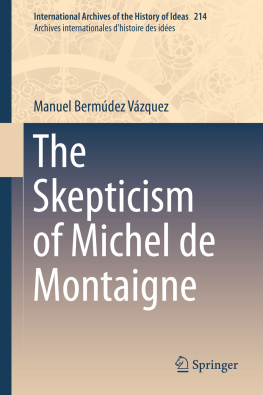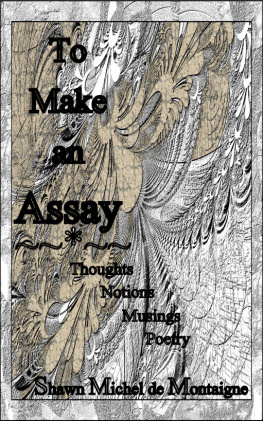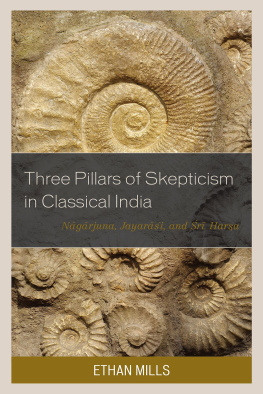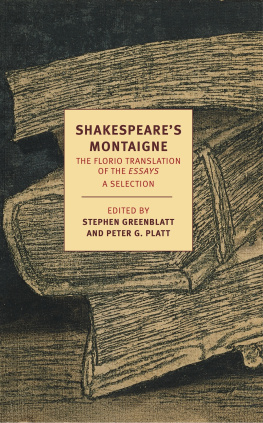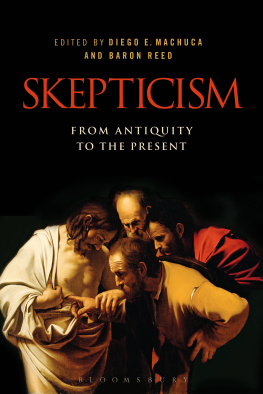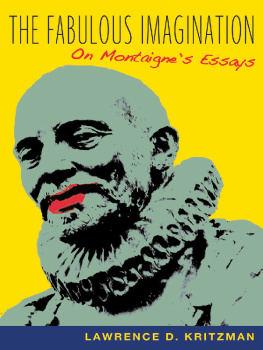1. Critical Reconsideration of Michel de Montaignes Skepticism
1.1 The Skeptical Tradition
Before a complete account of Montaignes skepticism can be given, a few words must be said, from my point of view, about the skeptical tradition out of which it emerged. A brief look also must be taken at the man himself and at his Essais . Finally, the standard account of Montaignes skepticism and the problems associated with it must be explored more thoroughly before an alternative and its implications for our understanding of Montaignes place in the history of skepticism can be laid out in full.
The skeptical tradition to which Montaigne was heir and from which his philosophy came had roots in Greek antiquity but spread, at least, some measure of continuity through the Middle Ages and into the early modern period. Within this rich and varied tradition, skepticism took many forms, ranging from the simple expression of doubt to the formal denial of the possibility of knowledge, from a sort of probabilism to debates about the relative roles of reason, experience and faith in the acquisition of knowledge.
In this brief overview, only a quick glance at the history of skepticism in Greek and, in a lesser extent, Roman antiquity, the Middle Ages and the early modern period is possible. This cursory investigation, however, will help to contextualize the skepticism of Montaigne.
The history of ancient skepticism extends from classical Greece in the sixth century before Christ through the late Roman imperial period in the third century anno domine . Although Greek skepticism did not come to full fruition until some time after the death of Alexander the Great in 323 B.C. in the Hellenistic period, to varying extents the principal Greek skeptics all claimed presocratic predecessors to their thought. Skepticism was also an important current in Hellenistic and Roman thought.
The story of ancient skepticism runs then from roughly the sixth century B.C., to the third century a.d. It would not have had any sense to make Pyrrho the creator of a philosophical school, because it was the origin of skepticism at stake, a line of thought that made its motto with the difficulties of grasping knowledge.
The history of ancient skepticism proper, however, begins in Platos Academy with the succession of Arcesilas (dead 242 B.C.) as head of the Academy around the year 273 B.C. Both Arcesilas second or middle Academy and the Third or New Academy established with the succession of Carneades (219129 B.C.) Academic skepticism flourished until 87 B.C. when the succession of Antiochus (dead 67 B.C.) signaled a return to a more dogmatic interpretation of Platos thought. Marcus Tullius Cicero (10643 B.C.) was heir to this tradition of Academic skepticism. Around the time of Antiochuss restoration of the Old Academy, Aenesidemus broke with the Academy and initiated a revival of pyrrhonic skepticism. The two most important descendants of this revived pyrrhonism were Agrippa in the first century A. D. and Sextus Empiricus, the last major and the culminating figure in the story of ancient skepticism, in the second century.
The leading proponents of Academic and Pyrrhonic
The relationship of Socrates and Plato to the skeptical tradition that had its real beginning in the Academy is not a simple one. Arcesilas and Carneades both claimed to represent the true spirit of the Academy, a claim with which Cicero seems to have concurred. The solution to this puzzle lies in a closer examination of the relationship of the thought of Socrates and Plato to the tradition of Academic skepticism. While such an examination lies outside the confines of the current study, some additional light needs to be shed on this subject before the nature of Montaignes can be explored fully, for both Socrates and Plato are crucial to the reading of Montaigne in this and many other aspects.
Although the answer to this question can only be sketched out here, its essence seems to me to lie in the fact that the Academic skeptics basically transformed the teachings of Socrates and Plato in a way that was neither wholly faithful nor completely unfaithful to their teachings. The Socrates portrayed in some of the early and late dialogues of Plato and in the writings of Xenophon, and to a certain extent Plato himself, considered skepticism or acknowledgment of the state of ignorance as a sign of the quest for a possibly unattainable knowledge. For Socrates, and possibly for Plato, skepticism was the symbol of the philosophers quest. Simply put then, among the Academic skeptics, the symbol of the quest became its essence, its end rather than its indication. For Montaigne, as for Socrates, however, it remained a symbol of a quest that for both in the final analysis was one for self-knowledge.
Socrates confession of his own ignorance was a powerful symbol for those who came after him. This was, perhaps, especially true in the sixteenth and seventeenth centuries. Indeed from antiquity through the present this image of Socrates has endured as one of the most resonant symbols of skepticism. Socrates was one of the first to make the distinction later elaborated by Plato and Aristotle between knowledge, that which can be known with certainty, and opinion, that which is, at best, only probable. For Socrates, the goal of philosophy was knowledge, a knowledge that was ultimately knowledge of self. This image of the historical Socrates comes principally from the early dialogues of Plato and such late works of Platos as the Theaetetus and the Parmenides and thus raises the question for Platos own views on the subject.
Plato has generally been regarded as a dogmatist, as asserting numerous positive claims about the self and the world, but the shadow of Socrates skepticism nonetheless permeates Platos writings, making Plato an important source for ancient skeptical ideas and making it impossible in the final analysis to view Plato as a thorough-going dogmatist. As Penner has shown, in the early Socratic dialogues, Plato was still in the shadow of his master, and his ideas were still very close to those of Socrates. Even in his later dialogues, however, and especially in such late examples as the Theaetetus and the Parmenides , where Plato returns to something of that earlier Socratic doubt, Plato continued to display the influence of Socrates. Furthermore, at the core of Platos thought, and crucial to his epistemology, is the idea presented in the Allegory of the Cave in the Republic and in passages in other contemporary dialogues that in this life the soul cannot have direct knowledge of eternal ideas. It is thus at least possible to read Plato as being committed ultimately to the proposition that real knowledge can never be attained in this lifetime. Socrates professed his own ignorance and his dedication to the unrealizable quest for knowledge. Plato asserted a number of positive claims while retaining a healthy doubt about the certainty of his own ideas, as we see in the Parmenides where he virtually overthrows all of his own main propositions. Pyrrho, the Academic skeptics and the later Pyrrhonians made this doubt, in one form or another, the end of the philosophical quest, rather than the sign of it.

